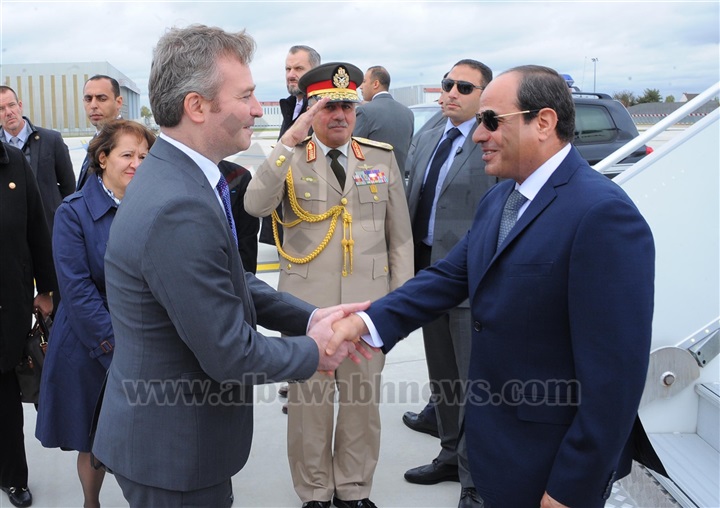President Abdel Fatah al-Sisi is visiting France for the first time after the election of French President Emanuel Macron. The top subject matters that will be discussed are combating terrorism, the Palestinian cause, and regional issues, such as Syria, Libya, illegal migration and trafficking.
On this occasion, the State Information Service (SIS) prepared a report recording the historical and contemporary relations between Egypt and France.
Historical Relations
The French campaign in Egypt, which lasted for three years between 1798 and 1801, contributed significantly to the cultural sphere, such as Jean-Francois Champollion inscribing the Rosetta Stone in 1799, opening the door for studying and exploring ancient Egyptian civilization. During the campaign, the French built the Egyptian Scientific Complex, also known as the Institut d’Égypte, which was set on fire during the January 25 Revolution in 2011.
Scientists within the campaign also wrote the “Description of Egypt” book, encompassing all known aspects of ancient and modern Egypt, as well as its natural history. The book, written by 160 civilian scholars and scientists, first appeared in 1809, and its final and 20th volume was issued in 1829. The original copies of some of its volumes were robbed when the complex was vandalized in 2011.
The Egyptian state had been granting students scholarships to study abroad since the reign of Mohamed Ali Pasha (1805 – 1848) until the end of the royal era in 1952. Among the most prominent students in those scholarships were intellectual Rifa’a al-Tahtawy (1801 – 1873) and writer and former Minister of Education Taha Hussein, Ph.D (1889 – 1973).
Political and Military Relations
There has been remarkable dialogue, coordination and proximity in views on the issues influencing the security and stability of the MENA region and Europe. Since the 1970s, Mirage fighters’ deals were closed between France and Egypt. Military deals expanded starting in 2015 to also include Mistral helicopter carriers, Dassault Rafale fighters, FREMM multipurpose frigates and more. In addition, joint military exercises have been taking place, such as the Cleopatra naval and urban exercises launched in 2017, the Nefertari air exercise, the Ramses military exercise, and the Bright Star exercises comprised of multiple nationalities.
Economic Relations
Trade exchanges between Egypt and France reached €1.546 billion ($1.82 billion) in the first eight months of 2017, marking an increase of 12 percent from the €1.38 achieved during the same period last year. Egyptian exports to France also rose from €332 million in 2016 to €401 million in 2017.
French investments in Egypt amount to €5 billion, represented through 160 companies hiring 30,000 employees in the sectors of food manufacturing, construction, energy, telecommunications, retail, banking, programming, medicine, transportation and tourism.
The top Egyptian exports to France are petrochemicals (€147 million), liquefied petroleum gas (€13 million), grains, citrus and vegetables.
Meanwhile, top French exports to Egypt are electronic and electric devices, information technology (IT) services, prosthesis, measuring devices, turbines, motors, visual media, cylinders, poultry, sugar, dairy products and transportation equipment. French exports to Egypt increased by 11 percent from €825.7 million in the first half of last year to €915.9 million in the same period this year.
The EU-Egypt Association Agreement activated in 2004 enabled the penetration of Egyptian goods to European markets in general and French markets in specific. In 2006, the Egyptian-French Business Council was founded to further boost partnerships.
Infrastructure Projects
French companies have executed the Cairo Metro, launched the Nile Sat satellites, installed a mobile phone network, restored the Suez Cement Factory, and constructed the Alexandria Oil Refinery, water supply stations in Fayoum and the 10th of Ramadan industrial zone, terminal 3 at Cairo Airport and its radar, an electricity station in Tanta, a wastewater treatment station in Gabal al Asafar, a thermal power station in Suez and Port Said governorates, and natural gas liquefaction plants. It also contributed in the construction of Bibliotheca Alexandria.
From 1974 through 2016, 40 cooperation protocols and agreements were signed between both countries in support of the economic development in Egypt. In 2016, 10 memorandums of understanding, valued at €308 million, were also signed.
Cultural-Scientific Cooperation
French-Egyptian Egyptology institutes and laboratories have unveiled many archeological discoveries. France also helped with renovating libraries, equipping museums, and collaborating in the fields of publishing, education and scientific research.
France established a university in Egypt and gives post-doctoral studies scholarships at a value of €200,000. It has also been helping to improve technology usage in the sectors of public administration, and justice through training sessions for public officials and judges in the National Institute for Governance and the National Institute for Justice.
Egypt’s Francophone population amounted to 2.8 million French speakers in 2010. It became a member state in the International Francophone Organization in 1983. The first ever director-general of the organization was Egyptian diplomat Boutros Boutros Ghali, serving between 1997 and 2002.
Visits throughout the last three years
President Sisi visited France in November 2014 and November 2016, while former French President Francois Hollande visited Egypt in April 2015 and August 2016. Reciprocal ministerial visits also took place frequently.








































admin in: How the Muslim Brotherhood betrayed Saudi Arabia?
Great article with insight ...
https://www.viagrapascherfr.com/achat-sildenafil-pfizer-tarif/ in: Cross-region cooperation between anti-terrorism agencies needed
Hello there, just became aware of your blog through Google, and found ...